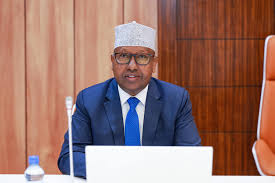

By: Abdi Jama
In the nuanced realm of diplomacy, the role of a Foreign Minister is paramount in bridging divides and fostering constructive international relations. However, the recent diatribes of Mr. Ahmed Moalim Fiqi, Somalia’s Minister of Foreign Affairs and International Cooperation, starkly deviate from these expectations, particularly in relation to the essential political and diplomatic engagement directed at the recent elections in Somaliland.
On November 13, 2024, the international community lauded Somaliland for conducting a transparent, fair, and peaceful presidential election—an event that not only marked a milestone in Somaliland’s pursuit of democratic governance but also presented a prime opportunity for Somalia to engage positively with its newly elected government. Instead, Mr. Fiqi chose a path of contention. By publicly questioning the impartiality of European diplomats who praised the electoral process in Somaliland, he undermined these crucial expressions of international support and casted a long shadow over the potential for constructive dialogue with Somaliland. He was expected to thank the European countries for their continuous support of the Somali people, which includes assistance with security in Somalia as well as support for democratic elections and developmental programs in Somaliland.
Fiqi’s accusations of bias and undue criticism toward European diplomats, coupled with his tendency to downplay and exhibit jealousy toward the significance of this democratic election to the people of Somaliland, did more than just strain relationships with European nations—nations whose partnership is vital for Somalia’s international standing, security and developmental support. These actions also disheartened the Somali people, who were eager to see the longstanding issues between Somalia and Somaliland settled peacefully once and for all. His approach has potentially derailed the fragile process of anticipated dialogue aimed at resolving the protracted dispute over Somaliland’s declaration of independence 34 years ago, a matter which continues to be a significant source of tension and division.
This diplomatic misjudgment carries broader implications. Mr. Fiqi’s refusal to recognize the high standards of the election in Somaliland not only halts momentum towards productive future dialogue but also fosters discord within Somalia itself, threatening internal unity and stability. Prominent figures within the Somali political elite, including MP Jama Askar, a seasoned politician and member of the Somali federal government parliament, have publicly criticized Fiqi’s undiplomatic and unconstructive stance. MP Askar has urged President Hassan Sheikh Mohamud to address the serious errors made by his Foreign Minister, stating that Minister Fiqi “appears to wield a divisive hammer, exacerbating wounds and crushing hopes of reconciliation and unity among Somalis.” He further noted, “A mentality driven by clan-based hatred and prejudice cannot restore the unity of our country or the solidarity of the Somali nation.” Fiqi’s reaction, marked by unexpected and deep hostility, jeopardizes the delicate relationship between the Somali Federal Government and Somaliland, potentially derailing any hope for resumed negotiations.
At a time when the Somali Federal Government and Somaliland were expected to embark on talks that could potentially lead to a long-lasting resolution of their differences, Mr. Fiqi’s rhetoric was particularly ill-timed. His approach has created a charged atmosphere more conducive to confrontation than to the constructive dialogue that is desperately needed. Instead of smoothing the path for critical discussions, his contentious statements have obstructed it, complicating an already delicate negotiation process.
The need for leadership that can navigate these complex regional dynamics with clear understanding and diplomatic finesse cannot be overstated. The stakes are high, as the future political stability and cohesion of Somalia, as well as its relationship with Somaliland, hang in the balance. Given these considerations, it is imperative for Somalia to reassess its diplomatic strategy, and the individuals tasked with its execution. A recalibration of leadership within the Ministry of Foreign Affairs and International Cooperation might be necessary to mend the fissures that have widened under Mr. Fiqi’s tenure and to restore the integrity and effectiveness of Somalia’s diplomatic engagements.
In conclusion, as Somalia strives to secure a place on the international stage and foster a peaceful, stable environment within its borders, the role of its Minister of Foreign Affairs and International Cooperation should be guided by a commitment to diplomacy that promotes reconciliation and cooperation, not division and discord. The future of Somalia’s diplomacy, and indeed its very cohesion, may well depend on such a transformation.
Abdi Jama is a seasoned expert in development, humanitarian efforts, and political systems in East Africa, offering profound insights into the region’s critical challenges and leadership dynamics. For inquiries, please contact: abdi.jama@gmail.com, WhatsApp: +46734763935
more recommended stories
 Somaliland Pursues Peace: First POW Exchange with Puntland Completed
Somaliland Pursues Peace: First POW Exchange with Puntland CompletedPresident Irro’s Dialogue-Based Approach Gains Momentum.
 From 1960 to Today: Somaliland’s Unbroken Case for Statehood
From 1960 to Today: Somaliland’s Unbroken Case for StatehoodSomaliland’s Foreign Minister Reaffirms Sovereignty, Urges.
 Gogol or Goodbye? Somalia’s Last Opportunity for Federal Reconciliation
Gogol or Goodbye? Somalia’s Last Opportunity for Federal ReconciliationBy Abdirahsid Elmi & Mohamed Musa.

Opinion: Reform Is a Marathon, Not a Sprint — Waddani’s Journey to Reform Somaliland – Hussein ElmiWhile slow reform progress raises concerns,.

